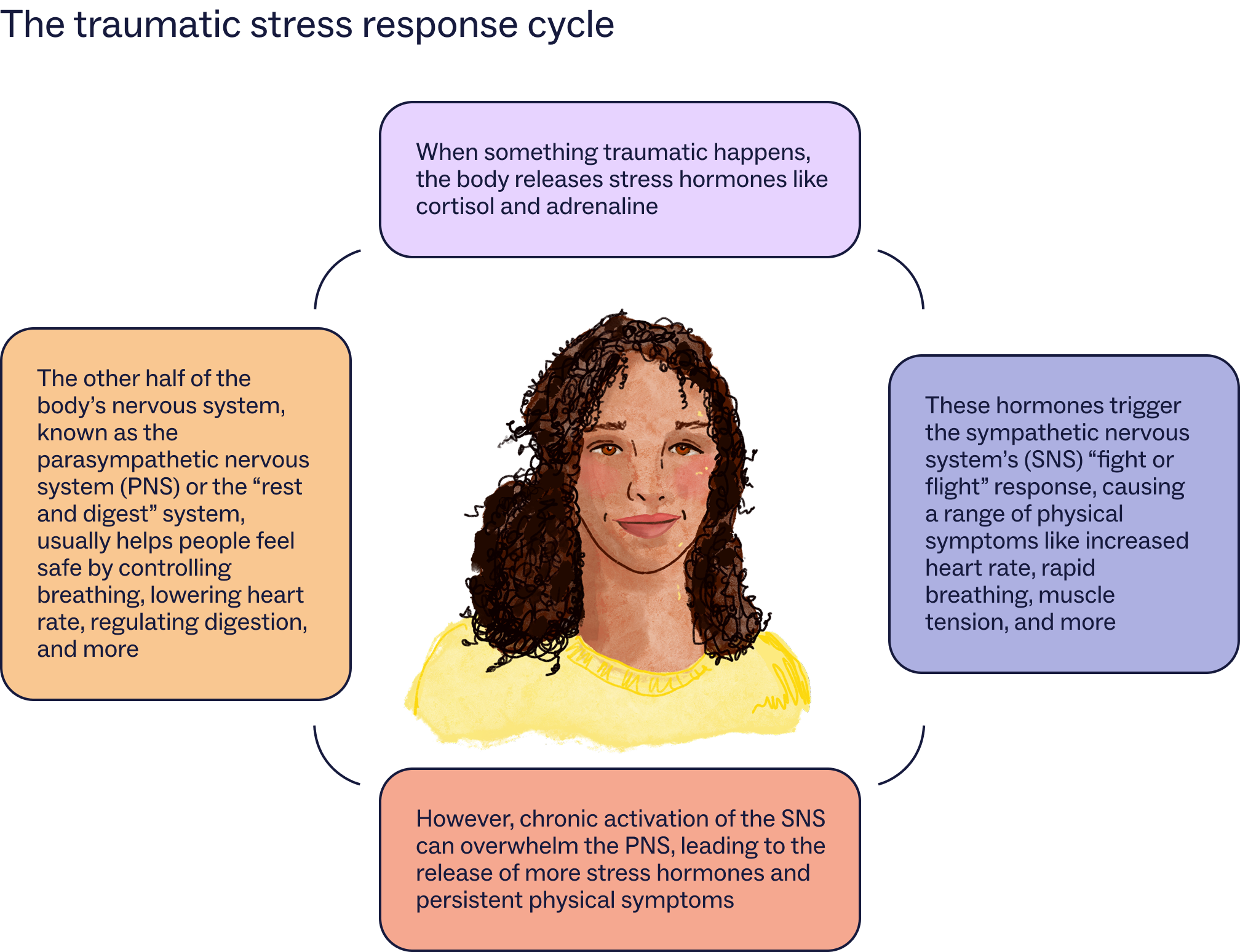
Table of Contents
How Does Your Body Remember Trauma?

Written By: Amanda Lundberg

Clinically Reviewed By: Dr. Don Gasparini
May 2, 2023
8 min.
Trauma leaves an imprint on your body that can lead to emotional and physical symptoms years after the traumatic incident. Here’s what that means for you.
Learn more about our Clinical Review Process
Table of Contents
Trauma affects your mind and body, even when you aren’t aware that it does. Years after the event, you can experience headaches, jumpiness, physical pain, and a suppressed immune system near the date of what had been an overwhelming experience.
Without help, untreated past trauma can significantly impact your future health. According to Harvard research, untreated trauma can increase your risk of obesity, heart attack, diabetes, cancer, and stroke.
Thankfully, this doesn’t have to be your future or the future of someone you love. Proper treatment significantly lowers the risk of these mental and physical health conditions.
How can the body react to trauma?
How you process a traumatic event is dependent on several factors. Your past medical and mental health history plays a part, as does the event and whether it happened to you or to someone you love.

Initial reactions usually include anxiety, confusion, exhaustion, sadness, and agitation. These are often socially acceptable, self-limited, and psychologically effective in helping you to cope with what you have seen or experienced.
Symptoms of a more severe response appear when you are not able to have periods of relative calm or experience intense intrusive thoughts. The type of trauma that triggers body memory can also vary. For example, the traumatic event may be a physical injury or emotional trauma; it may have occurred to you or a close friend or family member.
Child trauma, such as child abuse, can also trigger emotional trauma or psychological trauma. Your body’s trauma response is unique to your situation. In other words, three people can experience the same situation and have three different trauma responses, including the subsequent mental and physical symptoms.
When a traumatic event is debilitating, the brain may hide the memory to protect you from recalling it. Yet, the memories haven’t disappeared. Instead, they surface in other ways, such as post-traumatic stress disorder (PTSD), anxiety, depression, or symptoms of a suppressed immune system, like frequent colds and flu.
Join the Charlie Health Library
Get mental health updates, research, insights, and resources directly to your inbox.
You can unsubscribe anytime.
How unprocessed trauma is stored in the body
Most people have survived some type of traumatic event or situation. This can include a tumultuous childhood, racial discrimination, the loss of a loved one, or an emergency medical situation. Yet not every stressful situation is traumatic. The trauma depends on a person's psychological response to the event.
It's impossible to process the trauma while it's ongoing, but it's crucial to process trauma afterward. Left unprocessed, trauma can disrupt your life for years afterward and interfere with your sense of safety, your relationships with others, and your response to current stress.
Unprocessed trauma or unresolved trauma can get stuck in your body and brain. A traumatic experience causes the body to release stress hormones. This fight or flight response is normal and helps protect survival.
But when it becomes toxic stress, areas of the brain begin to change. These changes result in physical and emotional symptoms that are associated with past trauma. PTSD symptoms are one example of how unprocessed trauma can result in physical and psychological symptoms.
The mind-body connection is powerful, and scientists are continuing to find evidence of how this relationship affects your body. Although it's hard to imagine, when you feel positive or negative emotions, they're also experienced in parts of your body.
For instance, when you feel anxiety and fear, you may have noticed physical symptoms are mostly located in the chest area. Anger can cause muscle tension and stress in the neck, head, and shoulders, while depression can make your limbs feel heavy. These are representations of how stress and trauma can be experienced and stored in the body.
Where is trauma stored in the body?
The link between traumatic events and your body is in your nervous system. Unprocessed trauma causes your system to stay on "high alert," so you are ready to face the next threat. The need to protect yourself from perceived threats is stored in the emotional and memory centers of the brain.
These areas are activated whenever a similar situation presents itself and reminds you of past trauma. The symptoms of physical and mental trauma in the body include:
- Depression
- Trouble focusing
- Memory issues
- Trouble sleeping
- Feeling overwhelmed or on edge
- Muscle tightness and tension
- Nightmares
Trauma in the body can also exacerbate past medical issues like chronic pain or migraine headaches. Unprocessed trauma can also shrink your stress tolerance. This is your ability to handle stressful situations without becoming easily overwhelmed, also known as distress tolerance.
The situations that trigger symptoms are different for each person. However, most people find that their triggers remind them of the traumatic event. This means that even when you don't consciously remember the situation, your body and brain do. Triggers can include a place or object, situation, smell, sound, or emotion.
Trauma survivors report real physical manifestations leading from psychological stress, such as heart palpitations, tension, or pain. The National Council for Behavioral Health estimates that up to 70% of people have experienced some kind of traumatic event at least once in their lives.
There is also a link between trauma and addiction, as trauma is a risk factor in nearly all behavioral health and substance use disorders. Trauma in the body can lead to chronic stress, which in turn leads to a dysregulated stress system. This makes trauma survivors more vulnerable to addictive behaviors.
Stored trauma can lead to chronically and abnormally high levels of cortisol, which in turn can increase the risk of heart disease and stroke. Other physical manifestations include muscle tension, chronic injury, attempted suicide, and eating disorders. While it's not a completely scientific way of explaining the process, these are the consequences of unprocessed trauma that has become stuck or stored in your physical body.
What are researchers learning about how the body responds to major trauma?
Animals have a long history of psychiatric treatment. The first reported use of animals in psychological treatment occurred in the late 18th century. More recently, researchers have integrated animal-assisted interventions into the practice of treating physical and mental trauma.
Horses and dogs have more commonly been used to help reduce anxiety and depression and reduce symptoms of post-traumatic stress. Animals have the effect of helping to calm the nervous system. During a traumatic event, the nervous system can respond in several ways. These responses are sometimes called fight, flight, or freeze.
The body uses the acute stress response to prepare to run or fight. This is controlled by the autonomic nervous system that modulates breathing and heart rate. The autonomic nervous system has two separate systems: the parasympathetic nervous system and the sympathetic nervous system.
When you're in danger, the sympathetic nervous system releases stress hormones that raise your blood pressure, heart rate, and breathing. When the danger has passed, the parasympathetic nervous system puts on the brakes and calms the body, restoring it to equilibrium.
The Polyvagal Theory proposes that the vagus nerve is also involved in interpreting danger. Activating the vagus nerve can sometimes result in a freeze response when a person shuts down and becomes numb. One way the body remembers or stores trauma is the activation of one of these three responses when presented with a sensory stimulus that triggers a traumatic memory.
You may experience different psychological responses to a traumatic event. These responses fall under the physical, psychological, and emotional categories. Some of the more common reactions to trauma include:
- Losing hope for the future
- Inability to concentrate or make decisions
- Disturbing dreams and memories
- Avoiding people, things, and places that remind you of the event
- Fatigue and trouble sleeping
- Sweating
- Substance abuse, including alcohol, cigarettes, or drugs
- Worsening Ongoing medical problems
- Irritability, agitation, helplessness, and nervousness
- Inability to trust
- Feeling rejected, withdrawn, or abandoned

How to release trauma stored in the body to center your mind and ease stress
It is crucial to heal from unprocessed trauma, which helps to reduce chronic stress and improve overall health. There are a variety of ways to help a person process a traumatic event and thus reduce their mental and physical symptoms.
Trauma therapy helps reduce body memory and addresses past traumatic memory through behavioral health strategies. Trauma sensitizes the body's stress response system. By processing the traumatic event, you can help balance the natural reaction to stress and lower the risk of relying on unhealthy strategies such as smoking or consuming too much alcohol.
Eye movement desensitization and reprocessing therapy (EMDR therapy) is one example that has had success in treating PTSD symptoms. Therapists also use it in the treatment of anxiety, chronic pain, addictions, and depression.
Cognitive processing therapy is another common option for healing trauma. It's similar to cognitive behavioral therapy since it helps a person identify unhelpful thoughts related to a traumatic offense and teaches them skills to reduce emotional dysregulation.
Talk therapy has the advantage of helping you gain insight into how trauma impacts multiple areas of life, including core beliefs, worldviews, relationships, and mental and physical health. Somatic Experiencing (SE) is another type of therapy that helps the body release stress and trauma that has accumulated. The therapy involves physical interventions that directly impact the body, such as medications or low-dose electrical current.
Research has also suggested that exercise in combination with therapy can improve the level of success. For example, a 2022 literature review revealed promising results when yoga was used with psychological treatments for mental disorders. This is sometimes referred to as trauma-informed yoga.
How has basic research improved trauma care?
Several factors are associated with poor outcomes for most mental and physical health conditions. These include trauma, cultural, structural, and socioeconomic issues. The statistics on abuse and violence in the U.S. are sobering, including the large number of people who experienced trauma when they were children.
Research data show that using a trauma-informed approach to care helps to overcome some of these obstacles and improves outcomes for mental and physical health. Some of the principles of trauma-informed care include making the individual feel physically and psychologically safe, building trustworthiness and transparency, offering peer support and collaboration, and empowering and validating individuals, which steers them toward supporting their health and wellness.
These principles are crucial for individuals in a variety of situations, such as those undergoing general surgery, acute care surgery, or who are admitted into a critical care or surgical critical care unit. Trauma-informed care promotes healing and injury prevention for individuals whose bodies and minds are responding to unprocessed trauma.
Do you need more support with
your mental health?
Charlie Health can help.
Contact Charlie Health today
Getting the proper care helps to end the cycle of mental and physical health concerns that are the result of your body remembering trauma. The qualified and compassionate mental health professionals at Charlie Health work closely with you in a unique Intensive Outpatient Program that includes individual and family therapy and support groups.
Our Admissions team members are available 24/7. Reach out today to get started on your journey to health and wellness.





